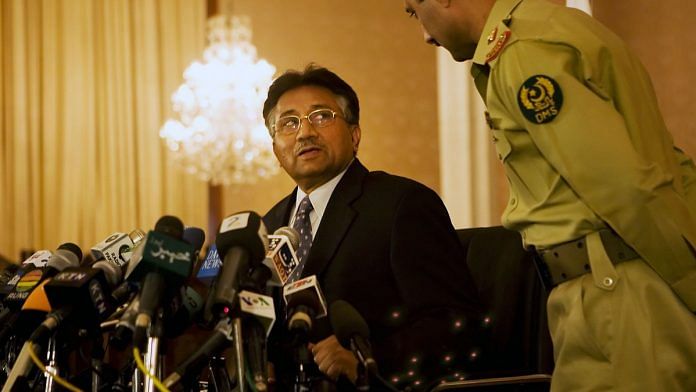New Delhi: A special court in Islamabad Tuesday awarded death sentence to former Pakistan President Pervez Musharraf who had been convicted for high treason earlier this year, local Pakistani media reported.
This is a first in the history of Pakistan.
The punishment for high treason is death or lifetime imprisonment, according to the High Treason (Punishment) Act, 1973.
The high treason case was filed against Musharraf by the Nawaz Sharif-led government in 2013, and he was charged with treason in 2014. Musharraf, who is on a self-imposed exile in Dubai, had denied the charges earlier.
A three-judge bench delivered a split 2-1 verdict, though the whole verdict will take another couple of days to deliver, according to Pakistani media reports.
According to Article 6 of Pakistan’s constitution, “Any person who abrogates or subverts or suspends or hold in abeyance, or attempts or conspires to abrogate or subvert or suspend or hold in abeyance the Constitution by use of force or show force or by any other unconstitutional means shall be guilty of high treason.”
“Pervez Musharraf has been found guilty of Article 6 for violation of the constitution of Pakistan,” government law officer Salman Nadeem said.
The case against Musharraf
The high treason charge was imposed on the former military ruler, who came to power by staging a military coup in 1999, for imposing a state of emergency in November 2007. The trial had been pending since December 2013.
The case against him deepened when in March 2007 when Musharraf made an attempt to remove Iftikhar Muhammad Chaudhry as the chief justice, which the Supreme Court of Pakistan called illegal. This led to massive protests by lawyers across the country, who were later joined by political parties and other groups.
The special court — headed by Peshawar High Court Chief Justice Waqar Ahmad Seth and comprising Justice Nazar Akbar of the Sindh High Court (SHC) and Justice Shahid Karim of the LHC — announced the verdict it had reserved on 19 November.
The special court at that time had said it would announce the verdict on 28 November on the basis of available record.
Days before the final verdict was to be announced, Pakistan’s Tehreek-i-Insaf (PTI) government had sought a deferment. In a fresh petition, it requested the Islamabad High Court that “the special court be restrained from passing final judgement in the trial”.
Subsequently, on 27 November, the court stopped the special court from issuing its verdict reserved in the case on 19 November. Additionally, they directed the government to notify a prosecution team by December 5, according to a Dawn report.
Musharraf won’t be hanged, say experts
Experts say it is unlikely that Musharraf will be hanged or serve a life sentence.
“I do not think he will be hanged. But this is significant. For the first time, an army chief has been found guilty. This only indicates the growth of a trend that the army in Pakistan can also be indicted and that its relevance is coming into question openly and publicly now,” said defence and strategic affairs expert S.D. Muni.
Muni added that an example of the judiciary getting stronger in Pakistan can be also seen in the controversy around the extension of tenure of Pakistan army chief Qamar Javed Bajwa.
According to T.C.A. Raghavan, director general of the Indian Council of World Affairs and former Indian High Commissioner to Pakistan said: “This shows a further evolution of the judiciary in Pakistan. I personally don’t think he will be hanged or have to undergo life imprisonment, considering he is not there and bringing him back to Pakistan appears unlikely. There will not be a domestic consensus on this issue.”
Also read: Treating Pakistan as a friend was a critical error: US officials in Afghanistan Papers
(This article has been updated with new information emerging from Pakistan)




The sentence may never be carried out. The General is ailing, may pass away in a foreign land. However, it is a small step in Pakistan’s constitutional evolution. Whatever little influence India has on developments in Pakistan – including by setting a good example – should be used to nudge things in a better direction. No country has a larger stake in the success of Pakistan.